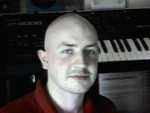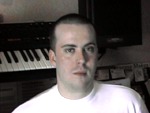|
||
|
Sean, Rob &
Phil |
||
|
Pariah interviewed by Mia Poirier & Jordan Hare 7/99 |
||
Background: Phil Jones, Sean Martin and Rob Clinton make up the Birmingham trio known as Pariah. Their last release on 720, "Catalyst" backed with "The Arrival", was heard revolving in many sets. Between jobs and library visits for samples, Pariah found time for some social interaction. |
||
| Tell us about your history…how long have you been Djing, producing and how did you get started? |
We started Djing about five years ago, we (Sean and Phil) just kind of ended up into it. We started making music about four years ago originally when we were messin' about. We started with an Amiga computer and found out that it was easier than we had thought it would be to make music. We thought we could probably make as good if not better music than what was coming out at the time so we just gave it a go. It took us a few years to save up enough money to get things going and Rob helped put in the initial investment. From the time we first thought of the idea it took about two years to get the money together and then literally just went and spent it all on equipment. We first had an article published about us in Muzik magazine when we won a Djing competition they had called "Bedroom Bedlam". Of the 20 winners, they chose the top 6 and we were chosen as one of the best. As a result of that, they wrote a four page article about us in the magazine saying that we were starting to make tracks. That's also how we came to know Terry, who runs Funk 21, and is friends with Blame. Around the same time we also got a call from Blu Mar Ten. So we got to know most of these people through the magazine. |
|
| How old are you all now? |
We're all 24 and we've been listening to this music for about the same period of time, since about 91. Well actually a bit before that since we went to our first rave in 89… So it's been 10 years… |
|
| What would you say are the biggest influences on your production? | We're influenced a lot by Blame actually. He helps us get a tune to its final stage. He's there to help because he gains something from the process as well. We've made about 35 tracks that he's liked. He's played about 20 of those and that's in a short span of time…around 15 months. Our aim is that any time he plays out, he plays at least one Pariah tune in his set. He's told us that there's usually at least one [in his sets] so basically a large percentage of his sound is what we give him. It's a mutual working relationship. We're obviously influenced by other Good Looking music, but you can't really narrow it down. We're more or less just freestyling. We think the appeal of our music is that we don't really sound like anyone else. Well at least we'd like to think so. | |
| What producers do you rate at the moment? | Blame, Big Bud definitely, Odyssey, Future Engineers, Seba, Blu Mar Ten, KMC, basically all the Good Looking Records artists because there's a reason they're all there. Bukem knows the score when it comes to people who can make good music because he gets to hear it all first since he's at the top of the tree. If he decides to put music out by any certain person, then it must be good. Obviously Bukem himself as well. But we think that Blame's approach to music is more forward thinking than anyone else. We just think he's so far ahead. | |
| What other types of music do you listen to? |
Phil: I actually used to hate music. Couldn't stand it until I was about 12 or 13. Then Sean had me listen to some reggae, which I started to get into. I sort of moved away from that into the early rave stuff. Rob: I deviated for a while into house. But I came back. I still like it along with some trance. Phil: I listen to a lot of different types of music when I'm searching for samples. I'll go to the library and get a lot of CDs to listen to and sample. |
|
| Could you give us a run down of the equipment that's in your studio? | Korg X5D, Korg Z1, Tascam DA20 dat recorder, Yamaha 01V mixing desk, JP 8000, Akai S2000, PC with Cubase, monitors are Absolute 2s, and Technics. | |
| If there was one additional piece of equipment you could have, what would it be? |
An EMU 64 sampler. Definitely. |
|
| How long does it typically take to complete a track? | We actually write down how long it takes to complete a track and it averages about 30 hours. We only go into the studio once a week now. Usually we start on a Saturday afternoon around 1 and work until 1 Sunday morning. So it takes about 3 to 4 weeks but it varies, depending on the track. A lot of preparation is done during the week like finding samples so we have something to start with when we go into the studio. | |
| So are all three of you in the studio when you produce? |
We pretty much always work together, but occasionally one of us can't make it. We prefer working together because a lot of it is about trial and error. It's not as if one of us does something and the two others do something else because that's not really constructive to us. |
|
| When you're making a track how much do you keep the dancefloor versus the home listening aspect in mind? |
Rob: We start out with the listening part of it but if the tune's got a club feel to it then we try to go with it. I think we go for both. Phil: I think the main objective is to do something different, but it has to be good enough for a DJ to play. Rob: Sometimes you don't want to do something too mad with the beats, because you might lose the dancefloor part of it. You don't' want to go too far as to throw the DJ off. Sean: Sometimes it's really difficult to strike a good balance. Phil: I think that's one of the hardest things to do because sometimes you can go a bit too far ahead, and it doesn't sound like a drum and bass tune anymore. But we try not to use the same beat. We make our own beats now and we'll use different parts of them for different tracks. I don't think we've used the same break in any of our tracks so far. |
|
|
What do think about the long breakdown that generally takes place in mellower drum and bass tracks? Some people argue that it's not very conducive to keeping the crowd dancing because the beats drop out. Do you have an opinion on that? |
Phil: Well you've got to keep the crowd interested, you've got to have a structure where there's something new coming in every 16 bars or at least a nice groove in the tune. Sean: …and sometimes you have to have the beat drop out to have it come back in again with more emphasis. Phil: A breakdown is good, but if it's too long, you're going to lose the crowd. You've got to keep sounds comin' in and out. Sean: Also if the tune was good enough before the breakdown then the crowd will stay and listen to it. Phil: Yeah that's if they're musically aware. If they're there just to sort of dance and have a good time, which is what it's all about at the end of the day, sometimes it (long breakdown) can be bad. It's kind of difficult because sometimes as a producer you're not looking at it as a punter. Instead you're always analyzing it . Sean: So it kind of ruins it in a way when you start making music because you're listening to it too much. Phil: So you're not really there for what the music is intended to do. We've put ourselves in a position where it's always going to be that way. But the most important thing is the people on the dancefloor, and you've always got to give them a reason to be interested. It's as simple as that. |
|
|
What do you think makes a good DJ set? Progression? Crowd reaction? |
Well, if you have about an hour or 2 hours then every tune has got to be good and it has to have stages. Basically it's just a matter of being put together properly. The most important thing we've learned from Blame is that you should play a set that's preprogrammed. We will get the set prepared and not stray from it regardless of the crowd's reaction. Because we put that set together the way we think it should be put together. It's probably a bad thing to say, but if the crowd doesn't like it then they can go into another room and listen to another style. It's our job to put it together the way we think it should be. That's what we're getting paid for. But a lot of people will say to me that if the crowd's not going with what they're playing then they'll change what they're gonna play, and to me that's wrong because you should stick to what you think is best. Someone has got you in the club to do a job because they believe that you can do it. If the people there don't appreciate that then that's not the Dj's problem. But it's understandable why people would think that's a bad way to look at things. It's only the up-and-coming people who seem to believe you should change what you're playing according to the crowd's reaction. That's what Blame has always said, " Stick to what you think is best, Stick to your own style regardless of what anyone else thinks". |
|
| What can we expect to hear from you in the future? | We've got another 12 inch coming out on 720 which is Fibers/Centure. We've got 3 tracks on the forthcoming 720 album 2 of which have already been released (Catalyst and the Arrival) and there's an exclusive called Sub-Zero. We've got the Nu Directions first release, a track called Meridian and another called Cascade. We also have an upcoming release on Good Looking Records called Skyline. At the moment that's it and then who knows. | |


